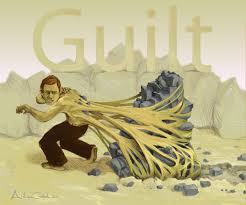 At our monthly grief support group, I have the privilege to listen to people’s stories and hear what they are experiencing during their grief process. Last month, I noticed a common thread between the stories – the presence of a deep sense of guilt, no matter the circumstance in which their pet died. I found it compelling that so many different grief journeys included such a strong theme of guilt.
At our monthly grief support group, I have the privilege to listen to people’s stories and hear what they are experiencing during their grief process. Last month, I noticed a common thread between the stories – the presence of a deep sense of guilt, no matter the circumstance in which their pet died. I found it compelling that so many different grief journeys included such a strong theme of guilt.
Why is it so painfully common to feel such tremendous guilt after a pet dies? Is there anything that can be done to move on from the feelings of regret and the intrusive “What Ifs”?
When a pet dies, it is completely natural and very common to experience feelings of guilt and regret. I often hear people say things like “What if I had thought to ask about it?” or “If only I had taken him to the vet sooner”. While asking ourselves these questions is normal, many of these recurring thoughts or feelings are not based in reality and can become intrusive, quickly taking over and preventing you from healing. Many people blame themselves for their pet’s suffering or death because of things they did or didn’t do. However, in many instances, recurring feelings of guilt and thoughts of “What If” are our ways of trying to find an answer for something that has no answer: “Why did my pet have to die?” When something devastating happens, it is easier to blame ourselves or someone else than to accept the scary reality that life is uncertain, and sometimes bad things happen for no reason and we aren’t able to control them. The truth is, even if you had never done a single thing wrong during your pet’s entire life, you would most likely still have moments of guilt and regret – it’s a part of human nature and it’s a part of losing a loved one.
Once we begin to understand that guilt is a normal part of grief, it’s important to break down that guilt into what is “usable” and what is better to let go. Sometimes there is value in asking ourselves what we could have done differently; doing so can help us grow and also plan for other pets in the future. For most of us however, the nagging thoughts of guilt are built upon things that are better let go. In the book When Bad Things Happen to Good People, Rabbi Harold Kushner writes, “An appropriate sense of guilt makes people try to be better. But an excessive sense of guilt, a tendency to blame ourselves for things which are clearly not our fault, robs us of our self-esteem and perhaps of our capacity to grow and act.”
For the things you wish you had done differently: acknowledge them, write them down, share them with others who can also learn from them, and then, most importantly, forgive yourself. Trust that you did everything you could have done with what you knew and had at the time. I try to remind people that when they were caught in the urgency of the situation, they made a decision based on something in their heart or gut in that moment. Show yourself compassion and trust in whatever it was that was leading you at the time. Of course hindsight brings new information and new perspectives, but ultimately, you need to forgive yourself for your regrets in order to heal.
In many cases, feelings of guilt become intrusive and begin to take over our thoughts and grief process. When you feel such thoughts taking over, try to stop them in their tracks. At the first thought of “I should have”, or “What if”, stop yourself. Some people find it helpful to repeat to themselves “I did everything that I could and I know that” or “I have no control over what happened” or “She knew how much I loved her” – anything that is meaningful for you and helps you to break the guilt thought cycle. It’s a lot like breaking a bad habit. After a while it will be easier to stop this unhelpful thought pattern and redirect yourself. It may sound simple or superficial, but it takes consistent work to break a habit and re-wire how you think.
At the end of the day, the most important gift you can give yourself while you are grieving is forgiveness. Be honest about your guilt – write it down, talk about it with someone you trust – and accept that guilt is another part of grief that needs to be faced and worked through. During your pet’s life, you loved them unconditionally and forgave them each time you saw a puddle on the floor or a garbage can knocked over. Right now, while your heart is aching, show yourself the same love and forgiveness that you always knew how to show them.

3 Responses to How to Pack for an Unexpected Guilt Trip